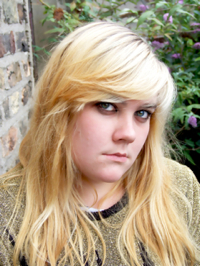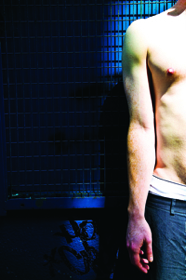This article was meant to be a post-mortem. My reflection on what happened and what that means now. As I write and think about the process, all I want to talk about are the flashes of memories. The moments that shook me. The reasons I had to make this piece. Before we began the actual devising process of Heroin, I undertook a huge research and development project. I was able to do this because CREATE believed in the idea and helped me get some money from the Arts Council's Artist in the Community Scheme. I decided to do this before I made any attempt to work on the show, because I was terrified. The subject was huge, and it felt huge. One of the lines from the show that stands out in my memory is: “This is about everything that ever happened,” and it was. The more I learned, the more I had to learn. Big heavy books. Hospitals and waiting rooms. Letters and offices and secretaries. Factors and patterns. Hunter S. Thompson and Ewan McGregor. Needle exchange. Harm reduction. Methadone.What does it actually look like?
You know a heroin-addicted child by its cry, its high-pitched scream. The sound echoes all over the ward, the nurses feel like it’s a battle lost.
I would interview the service users in little interview rooms. Paper cups and sugary tea. Crutches and always one of us injured. The space between grows smaller and smaller. Something in common with everyone. Went to school with your cousin. I know your sister. I know that, I’ve felt that. People. Just people in front of you after a while. The gap is closing in. The empathy felt. The pain seen. We’re all the same. We’re all brothers and sisters in Holy God’s family. No God now. No need. We’re all brothers and sisters. We’re all connected. We’re all invested. It matters to me what happens to you. It’s about value really. Value and choice. How much do we value life? Life has to be equal doesn’t it?
Walking home from the drug team with Shane. One of those days that’s a shift in the weather. This is going to be important Grace, isn’t it? Yeah. But you’re still terrified.
An education you can’t get from the books or the films. Throw it all away and put your hands on the people. Squeeze the hands. Listen about the miscarriage – or what their father did. Talk about what you did. There’s no interview now. Just people talking. Put your hands on the people. You’re not touching the subject. It’s not touching you. It’s one and the same.
This project becomes bigger than theatre, and simpler than the drug trade or the chemical workings of a drug in a body. I ask them, if they could identify one thing that they could change about how the rest of the world sees them, what would it be?
The words we use to describe them. The word "junkie". Don’t define me by this. I am more than this. This is not what I am. I am changing. There’s no more them. There’s no more separate. I had never thought of that before.
 I am changing, I’m getting excited. But terrified; no one wants to watch your heart bleed. We have to move forward faster. This is holding us back. Don’t ignore the suffering. And it’s all about context. I write the word “context” over nineteen pages of a single notebook. This isn’t about sense. “This is not journalism, Grace,” a friend screams down the phone.
I am changing, I’m getting excited. But terrified; no one wants to watch your heart bleed. We have to move forward faster. This is holding us back. Don’t ignore the suffering. And it’s all about context. I write the word “context” over nineteen pages of a single notebook. This isn’t about sense. “This is not journalism, Grace,” a friend screams down the phone.
The more you learn, the less you know. I feel better with everything I learn. Better and passionate. Words to describe passion. Fired. Psyched. No, that won’t work. There are no words. No words, just heroin. Heroin and people’s faces. Start to see people I’d never seen before. I am changing. I am different now. My place has shifted. My perspective is different.
I started to devise a piece of work with the Men’s Group at Rialto Community Drug Team. They wanted to make a piece about street language. How to conceal what you’re saying. We made a deal. If I would help them with their piece, they would help me with mine. I stand in a room that’s designed for meditation. There’s a Buddhist waterfall in the corner. More sugary tea. I teach these men things I learned in Dublin Youth Theatre about improvising and devising. The space grows smaller.
I find people to work with. I talk at them passionately about why we’re making this piece; why people need to see it. We start to move forward. Slowly at first, then faster than I could have imagined. I read Rachael Keogh’s book, Dying to Survive. I start and I literally can’t stop. Friends already. Connected. I call her. We have chips and cigarettes. She helps me make my play. She comes in and visits.
We build a flat and live in it. We build it in the theatre in St. Andrew’s Community Centre in Rialto. We live in Heroin and its volume lives in us. We work with the recovering addicts on their play. We show them ours. They laugh or they talk back. They storm out and slam the door. That sound will come back. I ask Rachael how she feels about the parts of her book we’ve chosen to use. This is more about you than it is about me, she says.
There’s no "they" now. We’ve moved. It’s us. We’re in this together. After a while it all becomes normal. The actors are making tea for the addicts. The addicts are directing the play. The director is being counselled by the criminals.
We build the flat and live in it, and living in it is very hard. Every day there’s a little explosion. We all make tea and sit around the table. I ream off speeches about passion, and community and why we are doing this. It’s not our fault these things happen. All we’re doing is showing it.
We build the flat and live in it, and we become very close. We have to. I tell Barry it’s his play really. It’s one of those rehearsal in-jokes. But it’s true. I don’t have to hold this on my own anymore. We’re all in this together. It’s important to all of us. Emma sits in rehearsals and announces that it’s all going to be okay. Doireann climbs through barbed wire to get the windows for the set. Shane leaves me a note in the rehearsal room. “Dear Grace, this just might be your masterpiece.” I’m not terrified anymore.
I think a lot about community. The Fringe is about community this year. We’re making this piece in a community and with a community, and so many people are involved. I start to see what happens when everyone gets this invested. There’s a moment in rehearsals that changes everything. I ask Lauren to do something and she can do it straight away. She’s been rehearsing it just in case.
We show the men’s group the finished show. Lauren falls on the ground and Billser goes over to help her. He asks her if she is okay. A section of audio plays, with names of all those who died in Fatima Mansions over the years. “That’s my best friend. I knew him. That’s my best friend.” We pause for a minute, but we keep watching. Conor is cooking up and the door slams again. Is that because of me?
 In the theatre, and overwhelmed. It works and it’s devastating. What I’ll remember is the sound the seats make when someone can’t take it anymore. Bang. Slam. The actors pause for a minute, respectful, then just keep going. It just keeps going, I think, relentless. This isn’t one of those shows I’ll toast and put to bed relieved. No. This is about everything that ever happened. The more we look at it the less we’ll know.
In the theatre, and overwhelmed. It works and it’s devastating. What I’ll remember is the sound the seats make when someone can’t take it anymore. Bang. Slam. The actors pause for a minute, respectful, then just keep going. It just keeps going, I think, relentless. This isn’t one of those shows I’ll toast and put to bed relieved. No. This is about everything that ever happened. The more we look at it the less we’ll know.
On the Monday of the run at around 3 p.m., we realise one of our actors is too sick to go on. I call my friend Conor, and he agrees to go on in a matter of seconds. He’s been involved with the show from very early on. I call Barry and Lauren and I ask them if they still want to do the show. They do. Conor arrives and is handed a script. This is at 4.30. Emma and Niamh get food for the actors. At 9.45, Conor goes on.
I really think about community. What I’m seeing, what I’m feeling is about strength. Endurance. I’ve never felt more together. More the same. More supported. This is about community. A well oiled machine. Live with the crisis and recover. Nothing stops, nothing starts, it’s one and the same. On the Wednesday night of the run, a lot of people from the community come to see the show. From all of the communities. The writers, directors, critics and our friends sit with the addicts and they watch. What we’re looking at is happening in the seats beside us.
What I’ll remember are those slams. The sound the seats make when someone can’t take it anymore. Is that because of me? I didn’t make this happen. I’m just making a play about it. Those noises are the reason I chose to do it like this, live, together in the same space at the same time. We can all feel it, witness it, make it – together. Not separate, not apart. As one and the same.
Grace Dyas is one third of THEATREclub, and is a writer and director. She is currently working on 'The Theatre Machine Turns You On: Volume II’, which runs at Project Arts Centre, Dublin, in February 2011.
www.create-ireland.ie